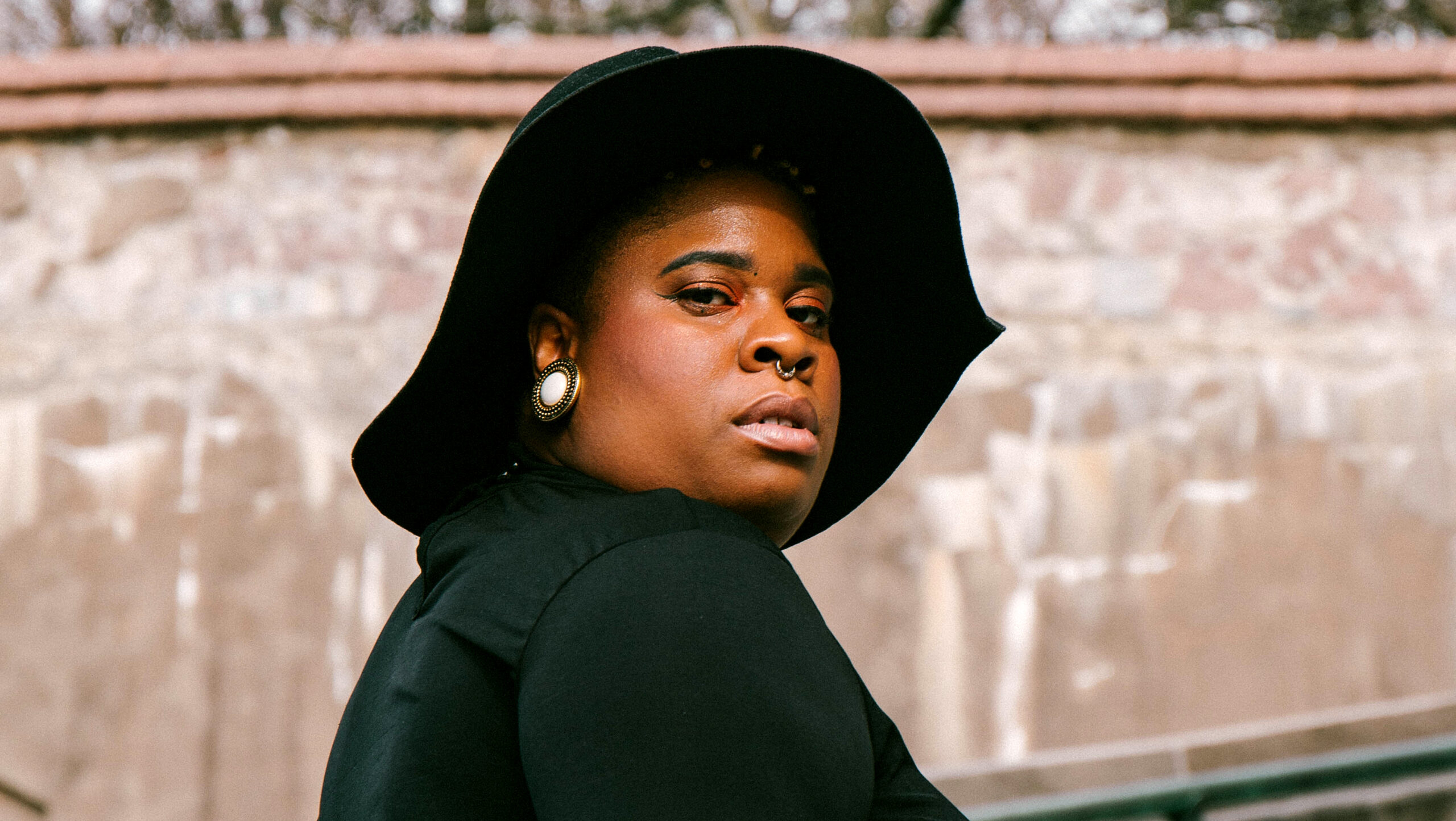Before she was ready to release her debut album, TiKA had to let go of her former self. Anywhere But Here, a project that was more than five years in the making, is a collection of ’80s influenced pop songs with a futuristic sheen that have their roots planted in painful memories. Emerging from a time she describes as being “battered by a string of abusive het cis relationships,” TiKA moved from Toronto to Montreal, came out as a queer woman and began her artistic metamorphosis. It was this time when she began working with producer Casey MQ, creating music with a process that felt like purging. Originally written and recorded in 2015, TiKA has finally delivered the album’s opening salvo with its stellar lead single “Sideways,” setting the stage for the full release in February 2021.
“The title of the album is Anywhere But Here because I wrote it when I was living in a place where I didn’t want to be,” TiKA says. “Now, in hindsight, I’ve realized that it wasn’t the environment or the people around me I was running away from, it was just myself. Making this album was a coming of age process. It’s my offering to the world about a very confusing time, and I hope it gives anyone experiencing this level of grief a warm hug.”
Over the past decade, the multi-hyphenate musician has become a powerful advocate for the people around her. From 2009 to 2015, TiKA organized The Known Unknown, a live series in Toronto connecting emerging and established talents. While she is credited with introducing big names like Daniel Caesar, Jessie Reyez and Haviah Mighty to wider audiences, TiKA says she struggled to receive support as the city’s only Black woman running a consistent monthly event.
“It wasn’t supported by any of the major funding bodies because they didn’t see it as a thing of value then,” she says, explaining that The Known Unknown occurred during a time before Toronto’s music industry had realized Black artists were “at the forefront of what’s pivotal, popular and hot.” The musicians she championed have gone on to become widely acclaimed, but they wouldn’t have received the same support without creating their own space to grow and flourish. “It was like our own High School Musical,” TiKA says, laughing.
Since moving to Montreal, TiKA has continued to use every available tool at her disposal to lift up her community. This includes doing makeup for Black trans artist Elle Barbara, as well as modeling in the 2018 and 2019 Sephora campaigns so that, as she says, “little chubby Black girls could see themselves.” She has also continued to promote live music with Iverna Island, a “grassroots travelling showcase” co-presented with NXNE and Pop Montreal. “I started it predominantly for women of colour because I wasn’t seeing any spaces for us to perform. My way of doing things is based on an artist’s perspective rather than an industry standard.”
“As an artist, it’s vehemently important that the people in control know that vulnerability needs to be at the forefront.”
While these are large-scale festivals, TiKA believes it is possible to act as a conduit between art and corporate culture, which mix, she says, “like vinegar and oil.” With her background as a promoter, TiKA knows how they can blend. “As an artist, it’s vehemently important that the people in control know that vulnerability needs to be at the forefront. If you want to work with people, you have to feel like you can trust them. What a concept!”
TiKA’s own musical expression began during childhood when she belted out Whitney Houston’s “Miracle” at a talent show in Jamaica, where she lived between the ages of nine and 11. After teenaged TiKA was discovered singing in a bathroom, she was encouraged to perform publicly again when she joined her church choir. Sadly, she got derailed. The experience of an abusive relationship in her early 20s caused a faltering of confidence, leading to a period of silence.
“Your voice is your intuition, and I find it’s the strongest richter scale for who I’m meant to be around,” TiKA says. “If I can sing around you, that’s a loud indication that my soul trusts you. I couldn’t sing around that abusive person, but I stayed in the relationship for almost two years. Then when I got out of it, I had been so diminished that I didn’t know how to do it anymore.”
Surprisingly, it was sitting in the audience at Toronto’s MTV Live broadcasts from 2005 to 2008 that brought her back. When microphones were offered to members of the crowd, TiKA discovered that she had a lot to say about the feelings she had repressed. Talking openly about trauma gave her the strength to host events for other artists, but she was still afraid to sing about her own pain. “I had built up layers of opinions from other people, projections and my own insecurities,” TiKA says. “I had to unravel all of that to get to the root of myself.”
Thanks to her producer, Casey MQ, TiKA was able to spend six months in 2015 channeling her most difficult experiences into the songs of Anywhere But Here. But she still wasn’t ready to share them with the world: She kick-started her career as an artist with two EPs and a slew of singles, featuring contributions from acclaimed artists like Sydanie and Clairmont The Second. These releases made a splash, but TiKA now realizes they were simply pit stops on the journey towards her debut album.
“I was going in a direction to rebuild my confidence, so I released two EPs and a slew of singles,” TiKA says. “Now I’ve realized that I was holding on to this time of my life. Any time people would tell me it’s time to release this album, I would decide to put something else out instead. It’s the most vulnerable body of work I have and it encompasses a part of my life that was really terrifying. It really scared me for five years—and still does—but I’m going to do it anyway.”
The album’s first single, “Sideways,” is a spellbinding power ballad about moving on from the shame caused by the mistakes that lead to the end of a relationship. TiKA transmutes her heartbreak into a melody that will send shivers down your spine, weaving through a unique world of sound including acoustic guitars, ghostly sirens and shimmering sax from Grand Analog’s Aubrey McGhee. The pièce de résistance is the pounding drums, exploding through the mix like if Amerie’s “1 Thing” was produced by Phil Collins.
“I felt sideways and unbalanced because I couldn’t envision my life without this person,” TiKA remembers. “Any time I had this gravity of sadness, I would call Casey and get into the studio. It was almost like a psychology session! I had the melody and would constantly sing it in my head on the subway. So we just kept building. Casey decided the drums needed to be an unexpected contrast, to add feelings of angst.”
“We can’t be out here faking the funk.”
At first, TiKA wasn’t sure if “Sideways” would work as a single, fearing that it might be too vulnerable and raw. Then she realized that’s why she needed to release it. “We can’t be out here faking the funk,” she says. “It’s exhausting to be out here pretending everything is fine, because the reality is that we’re in a global pandemic losing people and losing ourselves.” By baring her soul and pushing past embarrassment, TiKA has discovered she can provide solace to the listeners who find themselves in her vulnerability.
“Most people work 9 to 5 jobs and don’t have the time or the privilege to consider how they feel,” TiKA says. “I just want to remind people of that because I remember what it felt like when I didn’t have value. It was excruciating and everything was mundane. I wasn’t even here. If someone hears my song and it moves them to feel again, I’ve done God’s work.”


 Why you can trust Xtra
Why you can trust Xtra